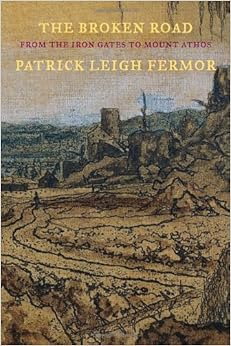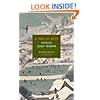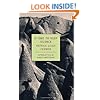
The Broken Road: From the Iron Gates to Mount Athos
and over one million other books are available for Amazon Kindle. Learn more


Flip to back
Flip to front

The Broken Road: From the Iron Gates to Mount Athos (New York Review Books Classics) Hardcover – March 4, 2014

$21.12
FREE Shipping on orders over $35.
In Stock.
Ships from and sold by Amazon.com.
Gift-wrap available.
NO_CONTENT_IN_FEATURE
Start reading The Broken Road on your Kindle in under a minute.
Don't have a Kindle? Get your Kindle here, or download a FREE Kindle Reading App.
Don't have a Kindle? Get your Kindle here, or download a FREE Kindle Reading App.
Best Books of the Month
Want to know our Editors' picks for the best books of the month? Browse Best Books of the Month, featuring our favorite new books in more than a dozen categories.
Want to know our Editors' picks for the best books of the month? Browse Best Books of the Month, featuring our favorite new books in more than a dozen categories.
Product Details
Would you like to update product info or give feedback on images?.
|
Editorial Reviews
From Booklist
*Starred Review* Reading classic travel writer Fermor’s body of work reinforces the conviction that a beautiful style is nearly requisite in travel writing to combine immediacy and resonance. Fermor (1915–2011) primarily made his name with two companion books, A Time of Gifts (1977) and Between the Woods and Water (1998), which chronicled his walk across Europe as a teenager in 1933 and 1934. A third volume, to complete an intended trilogy, did not see publication during his lifetime. Now, his literary executors (one of whom, Artemis Cooper, is the author of the recent and defining Patrick Leigh Fermor: An Adventure, 2013) have prepared the manuscripts he intended to use for the third volume—and thus the trilogy is complete. The notably handsome and inexhaustibly curious Englishman walks, on this final portion of his trek, through Bulgaria and Romania. Being on foot, he naturally experiences the landscape and the locals on an especially intimate level. As history has spilled heavily over these two countries since the time of the Ottoman Turks, history is woven into Fermor’s enlightening account. People, customs, and geography are what good travel writers seek and share, Fermor foremost among them. --Brad Hooper
Review
“When you put down The Broken Road you feel what [Leigh Fermor] himself felt on departing from Mount Athos…‘a great deal of regret.’” —Daniel Mendelsohn, The New York Review of Books
"By any standards, this is a major work. It confirms that Leigh Fermor was, along with Robert Byron, the greatest travel writer of his generation, and this final volume assures the place of the trilogy as one of the masterpieces of the genre, indeed one of the masterworks of postwar English non-fiction." —William Dalrymple, The Guardian
“[A]n unforgettable book, full of strange encounters with a prewar Balkan cast of counts, prostitutes, peasants, priests and castrati. The greatest pleasure of all, as usual, is Leigh Fermor’s own infectious, Rabelaisian hunger for knowledge of almost every kind. His memory seems eidetic; his eyes miss nothing. He seems to carry within himself a whole troupe of sharp-eyed geographers, art historians, ethnologists and multilingual poets. For anyone who has tried to document a journey, reading him is a humbling and thoroughly inspiring experience.” — The New York Times Book Review
“The descriptions of waking in unfamiliar places are so seductive that even the most home-hugging reader will long to wake somewhere unknown. And some of the evocations of landscapes and views will live long in the memory.” —Anthony Sattin, The Observer
“In the end, it’s his moments of joy, his revelling in a young man’s moments of epiphany, which stay in the mind.” —Neal Ascherson, London Review of Books
"The Broken Road is superb, towering about the usual run of travel books....The Broken Road is better than any gleaming capstone: while giving us a more than satisfactory idea of Leigh Fermor's Balkan adventures, it also, in its raggedness, accentuates the seamless magic of the books that came before, and it wraps the whole enterprise in a pathos that humanizes his superhuman gifts." —Ben Downing, The Times Literary Supplement
"In a lamplit frenzy of mystic dance and song, among Homeric fisherfolk and swains, young Paddy discovers the underground ecstasies of rebetika in all its 'quintessence of fatalism.' Glimpsed from the future, he sets a course for the Greece that would keep his prose dancing ever after." —The Independent
“The now-complete trilogy documenting his journey is essential curriculum for any traveler….Fermor’s youthful forays across Bulgaria and Romania to the coast of the Black Sea make the reader wish all of life were one long journey of slow mornings on Turkish divans, welcome platters of raki and Turkish delight, crackling firelight and long conversations in various languages…Even those who have never seen the Danube will be struck with nostalgia—not for the author’s memories, but for their own, encapsulated in that same crystal mien of idealized youth…” —Longitude
"A fitting epilogue to 20th-century travel-writing and essential reading for devotees of Sir Patrick’s other works." —The Economist
"How fitting, for a man so young at heart, with such a boundless appetite for life, that his last published words should be those of a wide-eyed 20-year-old, embarking on what will be a lifelong love affair with Greece. His editors, Colin Thubron and Artemis Cooper, have put this book to bed with skill and sensitivity. Friends and fans, acolytes, devotees and disciples can all rest easy. It was worth the wait." —Justin Marozzi, The Spectator
"The youthful joy shines through, and the deep cultural learning that was superimposed in later years is there in sufficient quantity to lend wonder to this fragmented tale....Anybody who loved its two preceding volumes will fall upon it hungrily. Anybody who has not read the two preceding volumes should do so without delay." —The Scotsman
Praise for Patrick Leigh Fermor:
"One of the greatest travel writers of all time”–The Sunday Times
“A unique mixture of hero, historian, traveler and writer; the last and the greatest of a generation whose like we won't see again.”–Geographical
“The finest traveling companion we could ever have . . . His head is stocked with enough cultural lore and poetic fancy to make every league an adventure.” –Evening Standard
If all Europe were laid waste tomorrow, one might do worse than attempt to recreate it, or at least to preserve some sense of historical splendor and variety, by immersing oneself in the travel books of Patrick Leigh Fermor.”—Ben Downing, The Paris Review
Praise for A Time of Gifts and Between the Woods and the Water, the first two volume in the trilogy:
"This is a glorious feast, the account of a walk in 1934 from the Hook of Holland to what was then Constantinople. The 18-year-old Fermor began by sleeping in barns but, after meeting some landowners early on, got occasional introductions to castles. So he experienced life from both sides, and with all the senses, absorbing everything: flora and fauna, art and architecture, geography, clothing, music, foods, religions, languages. Writing the book decades after the fact, in a baroque style that is always rigorous, never flowery, he was able to inject historical depth while still retaining the feeling of boyish enthusiasm and boundless curiosity. This is the first of a still uncompleted trilogy; the second volume, Between the Woods and the Water, takes him through Hungary and Romania; together they capture better than any books I know the remedial, intoxicating joy of travel." — Thomas Swick, South Florida Sun-Sentinel
“Recovers the innocence and the excitement of youth, when everything was possible and the world seemed luminescent with promise. ...Even more magical...through Hungary, its lost province of Transylvania, and into Romania... sampling the tail end of a languid, urbane and anglophile way of life that would soon be swept away forever.” —Jeremy Lewis, Literary Review
“A book so good you resent finishing it.” —Norman Stone
"The greatest of living travel writers…an amazingly complex and subtle evocation of a place that is no more." — Jan Morris
"In these two volumes of extraordinary lyrical beauty and discursive, staggering erudition, Leigh Fermor recounted his first great excursion… They’re partially about an older author’s encounter with his young self, but they’re mostly an evocation of a lost Mitteleuropa of wild horses and dark forests, of ancient synagogues and vivacious Jewish coffeehouses, of Hussars and Uhlans, and of high-spirited and deeply eccentric patricians with vast libraries (such as the Transylvanian count who was a famous entomologist specializing in Far Eastern moths and who spoke perfect English, though with a heavy Scottish accent, thanks to his Highland nanny). These books amply display Leigh Fermor’s keen eye and preternatural ear for languages, but what sets them apart, besides the utterly engaging persona of their narrator, is his historical imagination and intricate sense of historical linkage…Few writers are as alive to the persistence of the past (he’s ever alert to the historical forces that account for the shifts in custom, language, architecture, and costume that he discerns), and I’ve read none who are so sensitive to the layers of invasion that define the part of Europe he depicts here. The unusual vantage point of these books lends them great poignancy, for we and the author know what the youthful Leigh Fermor cannot: that the war will tear the scenery and shatter the buildings he evokes; that German and Soviet occupation will uproot the beguiling world of those Tolstoyan nobles; and that in fact very few people who became his friends on this marvelous and sunny journey will survive the coming catastrophe." — Benjamin Schwarz, The Atlantic
"Those for whom Paddy’s prose is still an undiscovered country are to be envied for what lies ahead-hours with one of the most buoyant and curious personalities one can find in English." — The New York Sun
"Mr. Fermor…is a peerless companion, unbound by timetable or convention, relentless in his high spirits and curiosity." — The New York Times
"We are aware at every step that his adventure can never be duplicated: only this extraordinary person at this pivotal time could have experienced and recorded many of these sights. Distant lightening from events in Germany weirdly illuminates the trail of this free spirit." — The New York Times
"The young Fermor appears to have been as delightful a traveling companion as the much older Fermor a raconteur." — The Houston Chronicle
"[A Time of Gifts, Between the Woods and the Water] are absolutely delightful volumes, both for those who want to better understand what was lost in the violence of Europe’s 20th-century divisions and for those who appreciate the beauty and thrill of travel writing at its best." — The Houston Chronicle
"Leigh Fermor is recognizably that figure many writers of the past century have yearned to be, the man of action." — The Guardian
"He was, and remains, an Englishman, with so much living to his credit that the lives conducted by the rest of us seem barely sentient-pinched and paltry things, laughably provincial in their scope, and no more fruitful than sleepwalks. We fret about our kids’ S.A.T. scores, whereas this man, when he was barely more than a kid himself, shouldered a rucksack and walked from Rotterdam to Istanbul." — Anthony Lane, The New Yorker
“Even more magical...through Hungary, its lost province of Transylvania, and into Romania...sampling the tail end of a languid, urbane and anglophile way of life that would soon be swept away forever.” —Jeremy Lewis, Literary Review
"By any standards, this is a major work. It confirms that Leigh Fermor was, along with Robert Byron, the greatest travel writer of his generation, and this final volume assures the place of the trilogy as one of the masterpieces of the genre, indeed one of the masterworks of postwar English non-fiction." —William Dalrymple, The Guardian
“[A]n unforgettable book, full of strange encounters with a prewar Balkan cast of counts, prostitutes, peasants, priests and castrati. The greatest pleasure of all, as usual, is Leigh Fermor’s own infectious, Rabelaisian hunger for knowledge of almost every kind. His memory seems eidetic; his eyes miss nothing. He seems to carry within himself a whole troupe of sharp-eyed geographers, art historians, ethnologists and multilingual poets. For anyone who has tried to document a journey, reading him is a humbling and thoroughly inspiring experience.” — The New York Times Book Review
“The descriptions of waking in unfamiliar places are so seductive that even the most home-hugging reader will long to wake somewhere unknown. And some of the evocations of landscapes and views will live long in the memory.” —Anthony Sattin, The Observer
“In the end, it’s his moments of joy, his revelling in a young man’s moments of epiphany, which stay in the mind.” —Neal Ascherson, London Review of Books
"The Broken Road is superb, towering about the usual run of travel books....The Broken Road is better than any gleaming capstone: while giving us a more than satisfactory idea of Leigh Fermor's Balkan adventures, it also, in its raggedness, accentuates the seamless magic of the books that came before, and it wraps the whole enterprise in a pathos that humanizes his superhuman gifts." —Ben Downing, The Times Literary Supplement
"In a lamplit frenzy of mystic dance and song, among Homeric fisherfolk and swains, young Paddy discovers the underground ecstasies of rebetika in all its 'quintessence of fatalism.' Glimpsed from the future, he sets a course for the Greece that would keep his prose dancing ever after." —The Independent
“The now-complete trilogy documenting his journey is essential curriculum for any traveler….Fermor’s youthful forays across Bulgaria and Romania to the coast of the Black Sea make the reader wish all of life were one long journey of slow mornings on Turkish divans, welcome platters of raki and Turkish delight, crackling firelight and long conversations in various languages…Even those who have never seen the Danube will be struck with nostalgia—not for the author’s memories, but for their own, encapsulated in that same crystal mien of idealized youth…” —Longitude
"A fitting epilogue to 20th-century travel-writing and essential reading for devotees of Sir Patrick’s other works." —The Economist
"How fitting, for a man so young at heart, with such a boundless appetite for life, that his last published words should be those of a wide-eyed 20-year-old, embarking on what will be a lifelong love affair with Greece. His editors, Colin Thubron and Artemis Cooper, have put this book to bed with skill and sensitivity. Friends and fans, acolytes, devotees and disciples can all rest easy. It was worth the wait." —Justin Marozzi, The Spectator
"The youthful joy shines through, and the deep cultural learning that was superimposed in later years is there in sufficient quantity to lend wonder to this fragmented tale....Anybody who loved its two preceding volumes will fall upon it hungrily. Anybody who has not read the two preceding volumes should do so without delay." —The Scotsman
Praise for Patrick Leigh Fermor:
"One of the greatest travel writers of all time”–The Sunday Times
“A unique mixture of hero, historian, traveler and writer; the last and the greatest of a generation whose like we won't see again.”–Geographical
“The finest traveling companion we could ever have . . . His head is stocked with enough cultural lore and poetic fancy to make every league an adventure.” –Evening Standard
If all Europe were laid waste tomorrow, one might do worse than attempt to recreate it, or at least to preserve some sense of historical splendor and variety, by immersing oneself in the travel books of Patrick Leigh Fermor.”—Ben Downing, The Paris Review
Praise for A Time of Gifts and Between the Woods and the Water, the first two volume in the trilogy:
"This is a glorious feast, the account of a walk in 1934 from the Hook of Holland to what was then Constantinople. The 18-year-old Fermor began by sleeping in barns but, after meeting some landowners early on, got occasional introductions to castles. So he experienced life from both sides, and with all the senses, absorbing everything: flora and fauna, art and architecture, geography, clothing, music, foods, religions, languages. Writing the book decades after the fact, in a baroque style that is always rigorous, never flowery, he was able to inject historical depth while still retaining the feeling of boyish enthusiasm and boundless curiosity. This is the first of a still uncompleted trilogy; the second volume, Between the Woods and the Water, takes him through Hungary and Romania; together they capture better than any books I know the remedial, intoxicating joy of travel." — Thomas Swick, South Florida Sun-Sentinel
“Recovers the innocence and the excitement of youth, when everything was possible and the world seemed luminescent with promise. ...Even more magical...through Hungary, its lost province of Transylvania, and into Romania... sampling the tail end of a languid, urbane and anglophile way of life that would soon be swept away forever.” —Jeremy Lewis, Literary Review
“A book so good you resent finishing it.” —Norman Stone
"The greatest of living travel writers…an amazingly complex and subtle evocation of a place that is no more." — Jan Morris
"In these two volumes of extraordinary lyrical beauty and discursive, staggering erudition, Leigh Fermor recounted his first great excursion… They’re partially about an older author’s encounter with his young self, but they’re mostly an evocation of a lost Mitteleuropa of wild horses and dark forests, of ancient synagogues and vivacious Jewish coffeehouses, of Hussars and Uhlans, and of high-spirited and deeply eccentric patricians with vast libraries (such as the Transylvanian count who was a famous entomologist specializing in Far Eastern moths and who spoke perfect English, though with a heavy Scottish accent, thanks to his Highland nanny). These books amply display Leigh Fermor’s keen eye and preternatural ear for languages, but what sets them apart, besides the utterly engaging persona of their narrator, is his historical imagination and intricate sense of historical linkage…Few writers are as alive to the persistence of the past (he’s ever alert to the historical forces that account for the shifts in custom, language, architecture, and costume that he discerns), and I’ve read none who are so sensitive to the layers of invasion that define the part of Europe he depicts here. The unusual vantage point of these books lends them great poignancy, for we and the author know what the youthful Leigh Fermor cannot: that the war will tear the scenery and shatter the buildings he evokes; that German and Soviet occupation will uproot the beguiling world of those Tolstoyan nobles; and that in fact very few people who became his friends on this marvelous and sunny journey will survive the coming catastrophe." — Benjamin Schwarz, The Atlantic
"Those for whom Paddy’s prose is still an undiscovered country are to be envied for what lies ahead-hours with one of the most buoyant and curious personalities one can find in English." — The New York Sun
"Mr. Fermor…is a peerless companion, unbound by timetable or convention, relentless in his high spirits and curiosity." — The New York Times
"We are aware at every step that his adventure can never be duplicated: only this extraordinary person at this pivotal time could have experienced and recorded many of these sights. Distant lightening from events in Germany weirdly illuminates the trail of this free spirit." — The New York Times
"The young Fermor appears to have been as delightful a traveling companion as the much older Fermor a raconteur." — The Houston Chronicle
"[A Time of Gifts, Between the Woods and the Water] are absolutely delightful volumes, both for those who want to better understand what was lost in the violence of Europe’s 20th-century divisions and for those who appreciate the beauty and thrill of travel writing at its best." — The Houston Chronicle
"Leigh Fermor is recognizably that figure many writers of the past century have yearned to be, the man of action." — The Guardian
"He was, and remains, an Englishman, with so much living to his credit that the lives conducted by the rest of us seem barely sentient-pinched and paltry things, laughably provincial in their scope, and no more fruitful than sleepwalks. We fret about our kids’ S.A.T. scores, whereas this man, when he was barely more than a kid himself, shouldered a rucksack and walked from Rotterdam to Istanbul." — Anthony Lane, The New Yorker
“Even more magical...through Hungary, its lost province of Transylvania, and into Romania...sampling the tail end of a languid, urbane and anglophile way of life that would soon be swept away forever.” —Jeremy Lewis, Literary Review
More About the Author
Discover books, learn about writers, read author blogs, and more.
Customer Reviews
Most Helpful Customer Reviews
25 of 27 people found the following review helpful
By
John the Reader
on September 25, 2013
Format: Hardcover
Comment
Sending feedback...
A broken repast, some scattered crumbs, some morsels missing and forgotten, some condiments lacking ... but still a feast! After a thirty year wait, Paddy's readers finally get to read the third volume of his planned series; recounting his youthful walk from England to Constantinople. Re-constructed from works he never finished editing, morsels of recovered diaries and letters, the volume, loving compiled by Colin Thubron and Artemis Cooper (what sterling editors) concludes, in an honorable way, the intention of the author.
Here again we hear that distinctive voice recount the joys and confusions of his youthful search for knowledge, experience that same dramatic contrasts between sleeping many weeks in the bone-chilling cold of smoky peasant cots with golden respites in the castles and chauffeur driven stays with the old, and already dying-out aristocratic of the olden Mittel-Europe.
The final chapter has echoes of the "Time for Silence" and "Mani" books that gloriously emerged from his later wanders in Greece and is extracted from one of the few diaries (The Green Diary) that survived his war-time exploits and the European ravages of the decades after his trip.
If it is perhaps true that this "broken" and unpolished volume is not the best introduction to the trilogy, it certainly is a vibrant and tempting overture to his subsequent writing in Greece. A wonderful, rich read.
Here again we hear that distinctive voice recount the joys and confusions of his youthful search for knowledge, experience that same dramatic contrasts between sleeping many weeks in the bone-chilling cold of smoky peasant cots with golden respites in the castles and chauffeur driven stays with the old, and already dying-out aristocratic of the olden Mittel-Europe.
The final chapter has echoes of the "Time for Silence" and "Mani" books that gloriously emerged from his later wanders in Greece and is extracted from one of the few diaries (The Green Diary) that survived his war-time exploits and the European ravages of the decades after his trip.
If it is perhaps true that this "broken" and unpolished volume is not the best introduction to the trilogy, it certainly is a vibrant and tempting overture to his subsequent writing in Greece. A wonderful, rich read.
Thank you for your feedback.
If this review is inappropriate, please let us know.
Sorry, we failed to record your vote. Please try again
15 of 16 people found the following review helpful
By
J. J. O'DONNELL
on September 26, 2013
Format: Kindle Edition
Verified Purchase
Comment
Sending feedback...
There are three passages of the first quality, the rest almost always high second, very few clangers. He wrote better books than this, but few write books as good as this.
Thank you for your feedback.
If this review is inappropriate, please let us know.
Sorry, we failed to record your vote. Please try again
17 of 19 people found the following review helpful
By
Marshal Berthier
on December 1, 2013
Format: Paperback
Comment
Sending feedback...
I unknowingly did some of the Fermor trek in the mid-'70's, although at that time few had heard of him, and I suspect none in the Boomer cohort. Certainly we would have idealized him in spirit, had we known. As I was newly out of the military, not particularly an outstanding academic, intent on being a writer, the connection would have been even stronger.
As I have read more, and more, and more about Fermor, including many of the less complimentary comments in parts of the British press, he has evolved; less idealized, more complex, less compelling. He certainly seems to have treated his wife like s***, and freely sponged off everyone at a world-class level. A frequently drunken, perennnially unemployed lecher, who also proved to be a writer with few equals: Indeed a "dangerous mixture of sophistication and recklessness." For greater detail on his life, a search on 'paris review fermor' should take you to 'A Visit with Patrick Leigh Fermor' by the Paris Review.
The first two are brilliant, almost defining their own class. So then, what to make of this one, how can you not fall under the Fermor charm? This last one, as others have observed, is much less smooth and polished. I think that's as it should be, and I have to wonder if he didn't have that in mind all along. Facing a reality he didn't have the will to romanticize, deciding to leave us struggling with a different Fermor. He'd have liked it that way, plus it appealed to his lazy side. The rest of us will just have to be content with what he left us, and I suspect he had that in mind as well.
As I have read more, and more, and more about Fermor, including many of the less complimentary comments in parts of the British press, he has evolved; less idealized, more complex, less compelling. He certainly seems to have treated his wife like s***, and freely sponged off everyone at a world-class level. A frequently drunken, perennnially unemployed lecher, who also proved to be a writer with few equals: Indeed a "dangerous mixture of sophistication and recklessness." For greater detail on his life, a search on 'paris review fermor' should take you to 'A Visit with Patrick Leigh Fermor' by the Paris Review.
The first two are brilliant, almost defining their own class. So then, what to make of this one, how can you not fall under the Fermor charm? This last one, as others have observed, is much less smooth and polished. I think that's as it should be, and I have to wonder if he didn't have that in mind all along. Facing a reality he didn't have the will to romanticize, deciding to leave us struggling with a different Fermor. He'd have liked it that way, plus it appealed to his lazy side. The rest of us will just have to be content with what he left us, and I suspect he had that in mind as well.
Thank you for your feedback.
If this review is inappropriate, please let us know.
Sorry, we failed to record your vote. Please try again
10 of 11 people found the following review helpful
By
Aviott John
on October 18, 2013
Format: Kindle Edition
Verified Purchase
Comment
Sending feedback...
This is the third volume of Leigh Fermor's wanderings on foot from the Hook of Holland to Constantinople. As a great fan of Leigh Fermor, someone who rates the first 2 volumes (Time of Gifts; Between the Woods and the Water) as a 5-star read, this 4-star rating was hard to decide. Although the writing is superb, there is some spark missing here that was very evident in the first 2 volumes.No wonder that he had such a difficult time finishing the 3rd volume. Despite the 4-star rating for this book, the trilogy as a whole gets a 5-star rating as 3 of the finest travel books in the English language. Also note: the German language translation of vol. 1: Zeit der Gaben, does not come anywhere close to the power of the original.
Thank you for your feedback.
If this review is inappropriate, please let us know.
Sorry, we failed to record your vote. Please try again
5 of 5 people found the following review helpful
By
piers s akerman
on January 25, 2014
Format: Kindle Edition
Verified Purchase
Comment
Sending feedback...
As a visitor to the Holy Mountain in the Spring of 2013, I found the last chapter particularly appealing (and wonderfully familiarly comforting) but all of Fermor's book evokes reminiscences of youth.
He was a gifted writer with a magnificent scope and breadth of intellect and interest.
He was a gifted writer with a magnificent scope and breadth of intellect and interest.
Thank you for your feedback.
If this review is inappropriate, please let us know.
Sorry, we failed to record your vote. Please try again
2 of 2 people found the following review helpful
By
John P. Jones III
TOP 1000 REVIEWERVINE VOICE on July 21, 2014
Format: Hardcover
Verified Purchase
Comment
Sending feedback...
In 1934, Patrick Leigh Fermor, then 18 years of age, set off to walk from Holland to Constantinople, traversing a Europe that would be largely devastated and irrevocably changed within a few short years. I recently read the first two volumes of this Trilogy, A Time of Gifts: On Foot to Constantinople: From the Hook of Holland to the Middle Danube (New York Review Books Classics) and Between the Woods and the Water: On Foot to Constantinople: From The Middle Danube to the Iron Gates (New York Review Books Classics). Obviously enthralled, I had to finish the story, and it was another excellent read. As with the other two volumes, he is writing this many decades after his originally hike, and so he has imposed more than a half century of erudition upon his youthful memories. At first glance, it may not seem to "work," but it certainly did for me. This volume is somewhat different than the first two, in that it was not finished when he died. It ends, literally in mid-sentence, and he has not quite reached Constantinople. Colin Thubron and Artemis Cooper have skillfully edited the work. They noted that he had written virtually nothing about the end point of his hike. Afterwards, he decided to tour the monasteries on the Mount Athos peninsula, in northern Greece. That account is some 80 pages of this book, and is produced as he wrote it in his diaries of the time. Thus, the reader can contrast the two styles, one a more straightforward youthful account, the other the decades of erudition layered on the original trip. He celebrated his 20th birthday in the St.Read more ›
Thank you for your feedback.
If this review is inappropriate, please let us know.
Sorry, we failed to record your vote. Please try again











